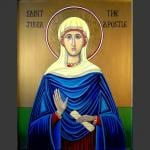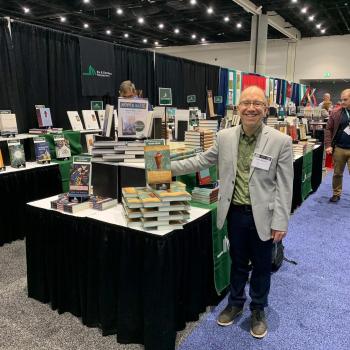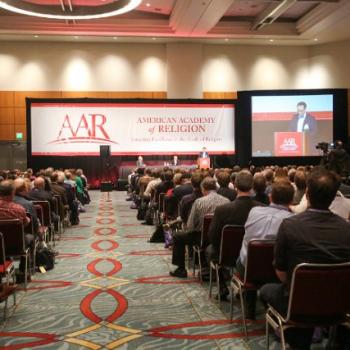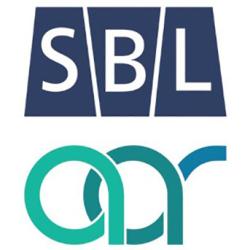Continuing the recap of NetVUE’s workshop on vocation and religious studies prior to AAR/SBL 2019 in San Diego, and in fact the same session that I was talking about in my last post, the next presenter (Trina Jones) used the very memorable phrase, “I tend to be a Jackson Pollock kind of thinker.” She shared how she taught an upper-level course, “Interfaith Engagement and Religious Pluralism,” twice, the first time during the Obama administration, the second during the Trump administration. There was a televised presidential debate held on their campus. Between the two the climate on campus was different.
She asked a great question: Whose work is this? How do we get those in positions of comfort, who are resistant to change, to see interfaith work as part of their vocation? She said it doesn’t work to force students to be generously open. That is like scheduling spontaneity. She also talked about teaching in the city she grew up in, after having lived elsewhere for 20 years, and having never expected to return. There are three parts to the course: civic grounds, philosophical and theological controversies, and during a middle section there is a trip to Washington DC. Funding from various sources helped underwrite the travel. She wanted students to understand how interfaith work can happen outside of the classroom. There were students who asked to audit the course, even if they could not go on the trip or had to pay their own way to go. Both times it filled up quickly.
She showed Pew data about nones on the first day of class. Several white students active in student government dropped the course after that first day the second time it was taught, while it was added by non-white students.
In 2015 the location visits included: Berkeley Center for Religion, Peace, and World Affairs; U.S. State Department (Shaun Casey); ISNA in Methodist building; Friday jummah prayers in the Capitol; PRRI; National Cathedral. In 2018 some were the same and some different: they could not visit the state department; United Methodist Building; UN foundation; Friday Prayers; Berkeley Center; Muslim Hip-Hop performance. After the latter a student said this was the first time she felt like being Muslim was cool.
Another important point that was made is that white people need to talk to white people about racism. It is exhausting for others, and the burden should not be placed on their shoulders. One student said they’ve had enough of interfaith after being shown data about demographic changes on the first day.

In religious studies we need to understand hybridized identities, and to help students understand, reflect on, and navigate this aspect of reality as well. One professor brought in a Hmong shamanist to talk to their class. Hmong students who were there said afterwards that the invited speaker didn’t represent their understanding of shamanism. At Augsburg they forefront vocation in all their classes. “The V Word” is used so frequently that students get sick of it. Stories are our primary form of meaning-making. Stanley Hauerwas says the mysterious thing we call the “self” is best understood as a story. In a class called “Religion, Vocation, and the Search for Meaning” one assignment is for students to write “letters to the class”: 250-300 words, written to other students in class, about how the reading for the week intersects with their own story. They also write “This I Believe” papers. Cultivating spiritual growth enhances academic outcomes for students. Vocational discernment leads to vocational action and practice in the “real world.”
During the Q&A it was pointed out that having two required courses in religion is curricular privilege. In a context of burnout and triage we may not be able to accomplish what we ideally would hope. Low expectations can be appropriate when the focus is care for students. Someone else said that hiring consultants from off campus instead of relying of faculty is a problem. They referred to “Parkinson’s Law”: as the British Empire was shrinking, there were more and more high level officers. It is important to a eparate out content from mechanics, especially in low stakes reflection assignments.
Explain to students why we are asking them the questions we do. One great way the importance of clear writing was put was this: “Can you express yourself so that your ideas make sense outside of your head?” Sometimes in learning the experience is the point, and whether we assign grades and if so what they are ought to reflect this. “There is no such thing as having a C+ experience.” For peer evaluation, have students put their name on the back of their paper, so that peers grade without knowing who it is by. Constantly remind student that no one guest speaker can represent an entire tradition.
One idea I had after diverse ways of exploring vocation were presented, and how they intersect and resonate more or less with different identities and trajectories, was to let students choose from among different reflection assignments/rubrics reflecting different ideas about and understandings of vocation.
My last post about this event will focus on the keynote address with which it concluded. In the meantime, take a look at the Vocation Matters blog for exploration of some of the ways fostering students’ exploration of vocation is directly relevant to our current crisis. See also this reflection by Jeana Jorgensen on how vocation applies to a non-religious academic in the current circumstances.













